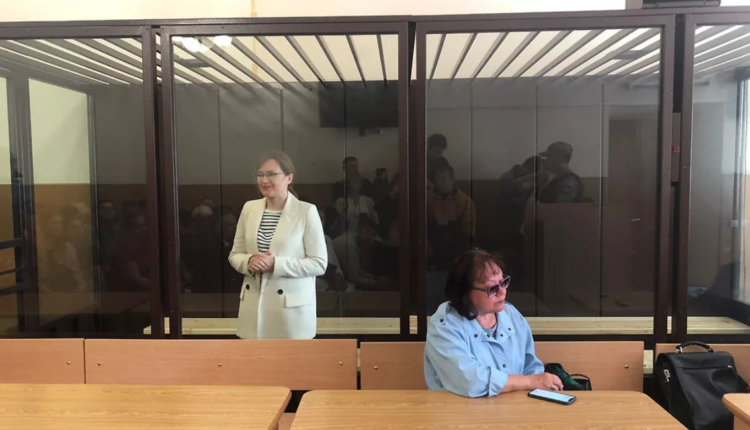The Prosecutor General’s Office of the Russian Federation has declared the activities of the little-known Bulgarian Law Sofia Foundation, the legal entity of the most, perhaps, the most famous Russian human rights organization Agora, undesirable in the Russian Federation. Lawyers and lawyers collaborating with her have been involved in the most high-profile cases related to politics, for example, representing Pussy Riot members or defendants in the Bolotnaya case in courts. It was the assistance to “oppositionists with a pronounced anti-Russian position” that the Prosecutor General’s Office called “undesirable activity” that threatens the foundations of the constitutional order. The constitutional expert recalls that the Basic Law guarantees the right to legal assistance to everyone without exception.
On Monday afternoon, the Prosecutor General’s Office announced that it had recognized the activities of the Bulgarian Law Sofia Foundation (Pravo-Sofia) as “undesirable on the territory of the Russian Federation”, noting that it was associated with the international human rights group Agora. The ministry said in a statement that they threaten “the foundations of the constitutional order and the security of the Russian Federation.” The Prosecutor General’s Office blames human rights activists for “focusing on covering and replicating the facts of alleged infringement of the rights and freedoms of citizens in Russia” and “on providing legal assistance to oppositionists with a pronounced anti-Russian position, including supporters of organizations recognized as extremist.” The decision to recognize the organization as undesirable was sent to the Ministry of Justice of the Russian Federation.
The first version of the organization, the Agora interregional association, was established by the Kazan Human Rights Center, the Chita Human Rights Center and the Chuvash human rights organization Shield and Sword in 2005. She was engaged in providing legal assistance to civil activists, NGOs and citizens who suffered from the illegal actions of police officers.
Agora lawyers worked at the Bolotnaya case, represented the interests of the Pussy Riot members, defended the Ukrainian director Oleg Sentsov accused of terrorism and the artist Pyotr Pavlensky, who was arrested for setting fire to the door of the FSB building on Lubyanka.
Also, the lawyers of the organization represented, for example, the interests of Telegram in a dispute with the FSB of Russia (the service demanded that the administration of the messenger provide decryption keys for user messages). In 2014, the Ministry of Justice recognized Agora as a foreign agent, in 2016 the association was liquidated by the court at the suit of the department. After that, the international human rights group “Agora” appeared. In 2021, about 50 lawyers and lawyers collaborated with her (handled over 300 cases).
Since its inception, Agora has been headed by lawyer Pavel Chikov. From 2012 to 2019, he was a member of the Council under the President of the Russian Federation for Human Rights. In March 2023, the Ministry of Justice added Mr. Chikov to the list of foreign agents. On Monday, he told Kommersant that Agora was not commenting on the decision of the Prosecutor General’s Office.
Lawyer in the field of constitutional law Ivan Brikulsky draws attention to the arguments of the Prosecutor General’s Office that “legal assistance to the opposition” threatens the foundations of the constitutional order. He recalls that Art. 48 of the Constitution of the Russian Federation guarantees everyone “the right to receive qualified legal assistance” and it “is absolute”, which follows from Part 3 of Art. 56 of the Basic Law. “This right can never be limited by anyone – neither by the department, nor by the law,” adds the lawyer. “The moment of receiving this assistance should be determined by the person who needs help. And he also determines who exactly provides assistance.
Artem Yablokov, a partner at the Yablokov Brothers law firm, believes that those associated with Agora “now or in the past will face difficulties.” He recalls that federal law No. 272 prohibits undesirable organizations from operating in the Russian Federation, and citizens from participating in their activities under the threat of administrative or criminal punishment.
“But an individual cannot be recognized as “undesirable”, therefore lawyers and lawyers can continue to provide legal assistance in private practice outside of Agora. According to the Constitution, their right to work cannot be restricted,” says Mr. Yablokov.
However, he finds it difficult to predict what will happen within the framework of the trials, “it is unlikely that the judges will, on their own initiative, check and establish the connection of these lawyers with an undesirable organization, it’s another matter if the lawyer himself declares this.” In the latter case, he can be brought to administrative or criminal liability, and in the processes there may be grounds for the removal of lawyers, adds Artem Yablokov. The same consequences can occur if the connection with the undesirable organization is declared by the other side of the process, the expert says.







